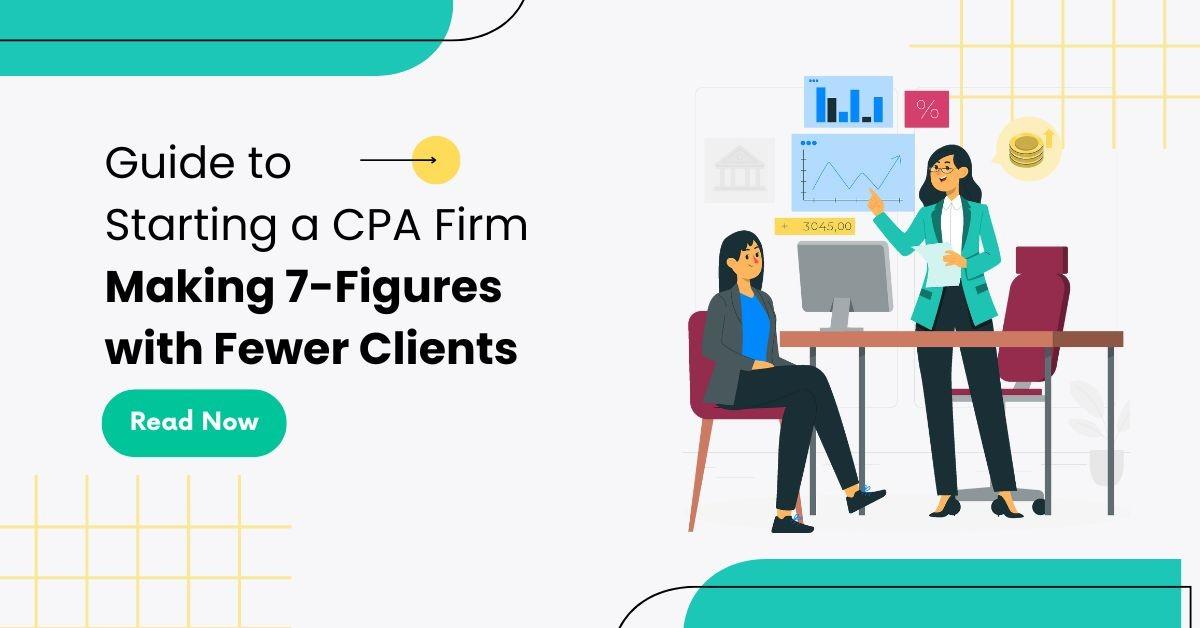
22 Accounting Social Media Posts for Firms (That Aren’t Boring)
Still posting boring “get your books done” posts for marketing for CPA firm? STOP. Get inspiration for accounting social media posts that work + post angle inside

Build the Firm you want from Day One
I’ve had conversations with hundreds of accounting and tax firm owners about their capacity and profitability challenges. A few of them trusted us as their staffing partner. We also provide consultation as an add-on service to solve the underlying issues that are stopping firm owners from achieving desired results. After working together and reaching the good side of running an accounting firm, I often ask my clients – “What’s one thing you’d do if you were starting a CPA firm today?”
This blog is a compilation of those valuable insights (make sure to check out my favorite one at #5 below).
Today, many firm owners aspire to achieve a 7-figure income, and some are already living that dream. Others might not aim for that level of revenue but still desire a better work-life balance—working fewer hours while maintaining their income.
If you’re content with running your accounting firm in a “Michael Scott” style, this blog isn’t for you.
But if that’s not the case, stick around. I have plenty to share.
In 2023, Financial Cents surveyed 261 firm owners, revealing that 10.3% were in the 7-figure revenue bracket.
The average total revenue for these firms was $623,296, with revenues ranging from $1,000 to $10,000,000.
I have seen many firms achieving 7-figure mark in just 3-4 years. And then there are few that just keep on juggling the tax preps for 15 years.
What to do to not be in the latter category? Let’s go!
There’s a common misconception that earning more revenue means simply bringing in more clients. When starting a CPA firm, many firm owners start with rock-bottom pricing often finding themselves overwhelmed, struggling to keep up with client work.
This is the most important lesson when starting a CPA firm – Skip Client Overload. And to have higher revenue with fewer clients, you need to learn strategy #3 and #4.
Here’s the issue with that mindset: to attract and retain top talent, you need to offer competitive salaries. When your pricing isn’t aligned, it’s tough to pay your employees what they deserve. Eventually, they leave for better pay and a healthier work-life balance.
Burnout has become all too common in the accounting industry. While many blame it on pipeline issues, I believe poor capacity management is the real culprit.
Effective capacity planning in a tax and accounting firm involves managing resources, time, and client expectations to ensure smooth operations—especially during peak seasons like tax time. Let’s shift the focus from just chasing clients to creating a sustainable model that benefits everyone involved!
As an accounting firm owner, you want everything to be perfect. Most probably you left public accounting starting your CPA linking your reputation with your firm. You’ve built your reputation on delivering high-quality work, and the thought of letting go of control can feel daunting.
But if you’re serious about scaling your firm, making high revenue with fewer clients, and avoiding overwork, then delegation is essential.
Many accounting firm owners find themselves buried under routine tasks—processing accounts payable and receivable, preparing tax returns, conducting cash flow analyses, and answering endless client emails.
While these day-to-day tasks are important, they can be incredibly time-consuming and keep you from focusing on the strategic activities that will drive your firm’s growth.
What’s the downside of this constant grind? It creates a bottleneck.
When you try to do everything yourself, it slows down your workflow and holds you back from scaling. The real issue? A lack of delegation.
To break free from this, here’s what you should do when starting a CPA firm:
Not sure how to implement these strategies? At Credfino, we help clients streamline their processes and get future ready. Schedule a call with us to get started!
Let’s start shifting that focus and empower your team to take on the tasks that will free you up for the big-picture strategies!
The debate over whether to niche down and provide specialized services or remain a generalist is common in many industries, including accounting. But honestly, it shouldn’t be a debate at all.
The angle of the question is simply off.
You need to find your niche, develop your expertise, and tailor your messaging to attract clients in that area for higher revenue. And who says that niche professionals can’t still serve general clients?
When starting a CPA firm, build a diverse list of clients but meanwhile keep on looking for your niche.
Think about it: If you have a heart problem, you go to a cardiologist. But that doesn’t mean the heart specialist is clueless about hypertension—they know how to prescribe telmisartan!
GENERALISTS vs. SPECIALISTS
Accountants as Generalists:
Accountants with a Niche:
Most accountants start as general practitioners and remain that way due to the diversity of their clients.
The next step is to discover your specialty—also known as niching down—which can take time as you identify what you excel at and how to communicate that to your ideal customers.
Another common concern I hear is, “What about my other clients?” Choosing to specialize doesn’t mean you have to exclude non-niche clients. It means you’re marketing and branding more effectively to a targeted audience.
The goal of niching down is to increase profitability by providing solutions to complex problems, all while still catering to your “good” clients.
Even specialists have some clients who don’t quite fit.
On a side note, being a generalist absolutely works.
But specializing can help you:
Need assistance with defining your ideal client profile? Let’s talk!
In Strategy #1, we discussed how low pricing can lead to an influx of clients, overwhelming you and trapping you in a constant training loop—making it nearly impossible to retain top talent. The solution? Determine the right pricing.
When starting a CPA firm, pick the right pricing model as changing the pricing in future can be tricky.
There are several service pricing models to consider—cost-based pricing, flat fee pricing, billable hours, and more. In the accounting industry, billable hours are the most common pricing model. However, this approach can hinder firm owners from truly growing their businesses.
If you’re serious about driving high revenue, value-based pricing is the way to go. Many firm owners also offer subscription-based services, which work well for some. The best choice for you will depend on the specifics of your practice.
Let’s figure out together, which pricing model is the best for your accounting firm.
As an accountant, you might believe compliance is your specialty. But the truth is, you have the unique ability to see the bigger picture behind the numbers. You can hear the story those numbers are telling.
When you act as proactive partners, you help clients anticipate and tackle potential challenges. This positions you as a valuable resource, not just someone who fulfills compliance requirements. And the more value a client sees in you, the easier it becomes to implement value-based pricing.
Clients see you as their right hand. Offering advisory services often requires specialized knowledge and skills, allowing you to charge premium rates. This can include strategic planning, financial forecasting, risk management, and business valuation.
When accountants step into the advisory role, they foster deeper relationships with clients rooted in trust and confidence. As a result, clients are more likely to rely on your advice and recommendations.
Bid Adieu Compliance Services to an Offshore Accounting Partner
If you’ve ever worked longer than the agreed-upon project timeline without getting paid for it, you’ve fallen victim to scope creep. Simply put, scope creep occurs when you do out-of-scope work without any additional compensation.
Providing those extra services requires additional time and resources—resources that could be better utilized on other clients who are willing to pay for that work. By not saying no to scope creep, you’re essentially leaving money on the table.
When starting a CPA firm, it’s crucial to learn how to avoid scope creep from the very beginning. Once a client receives extra services without charge, they’ll expect the same treatment in the future.
Set clear boundaries and protect your time to ensure your firm’s growth and profitability!
According to a 2022 Financial Cents survey, 24.2% of firms noted that faster turnaround times were their biggest benefit from automation. Other advantages include saving time and resources and eliminating mundane tasks. By the end of 2022, ChatGPT also made waves, significantly boosting automation in accounting.
It’s safe to say that AI and automation are no longer just nice-to-haves—they’re essential for firm owners aiming for high profitability.
However, implementing these tools does come with challenges. Navigating APIs and the latest technology can be daunting, especially if you’re not tech-savvy. This fear often leads many accounting and tax firms to shy away from automation. This is where partnering with a staffing firm also front runner in technology helps.
There are numerous daily accounting tasks that can—and should—be automated. And if you are starting a CPA firm, you cannot miss these-
Some of these tasks can be fully automated, while others will save time without completely replacing human involvement.
Not sure where to start or can’t find the time to set it up? I’d love to help you get started!
Related Read – Automation & Virtual Bookkeeping: A Match Made in Heaven
With all the points we’ve discussed, I encourage firm owners to adopt a strategic mindset when starting a CPA firm. You don’t want to find yourself bogged down by deliverables, mundane tasks, and low revenue. To avoid that, implement the right strategies from day one to build the firm of your dreams.
People will value your work when you value it yourself, so steer clear of low prices and scope creep. Focus your energy on high-value tasks and let your team and automation handle the daily routine.
And remember, to keep yourself and your team happy, don’t take on more work than you can manage.
We’ve covered ways to implement these strategies—now it’s your turn.
If at any point you feel overwhelmed, short-staffed, or in need of expert advice, Team Credfino is just a call away!

Still posting boring “get your books done” posts for marketing for CPA firm? STOP. Get inspiration for accounting social media posts that work + post angle inside

Social media for accountants helps firms grow by attracting better clients. But how to make it work and where to post – LinkedIn, YouTube, or other platform? Read here

Looking to hire an offshore accounting team? Here are 5 skills that you should look for before making the decision.